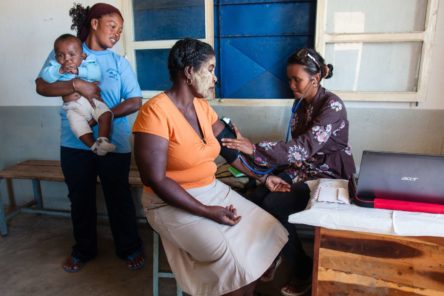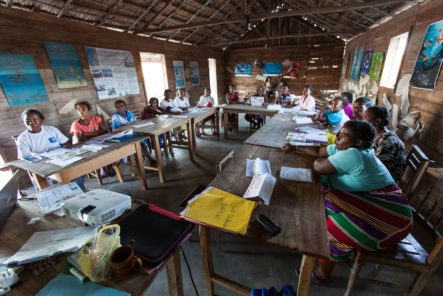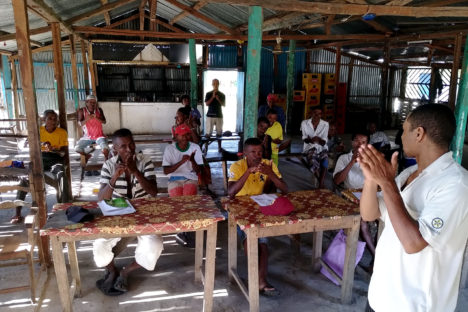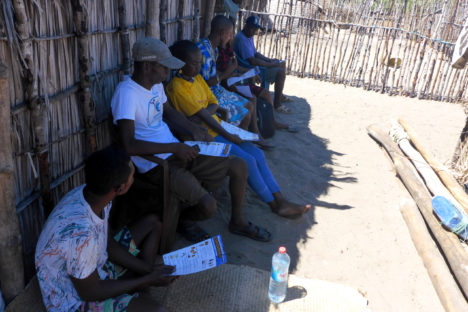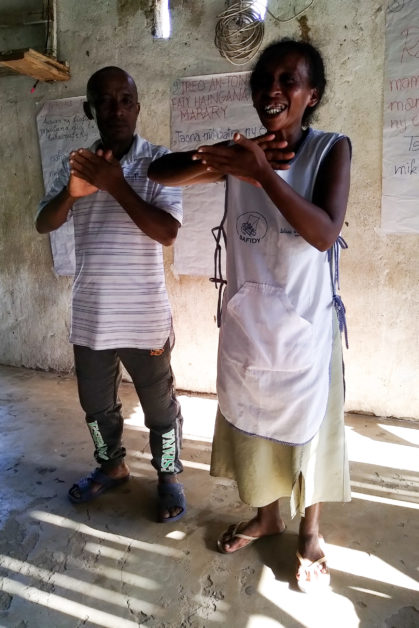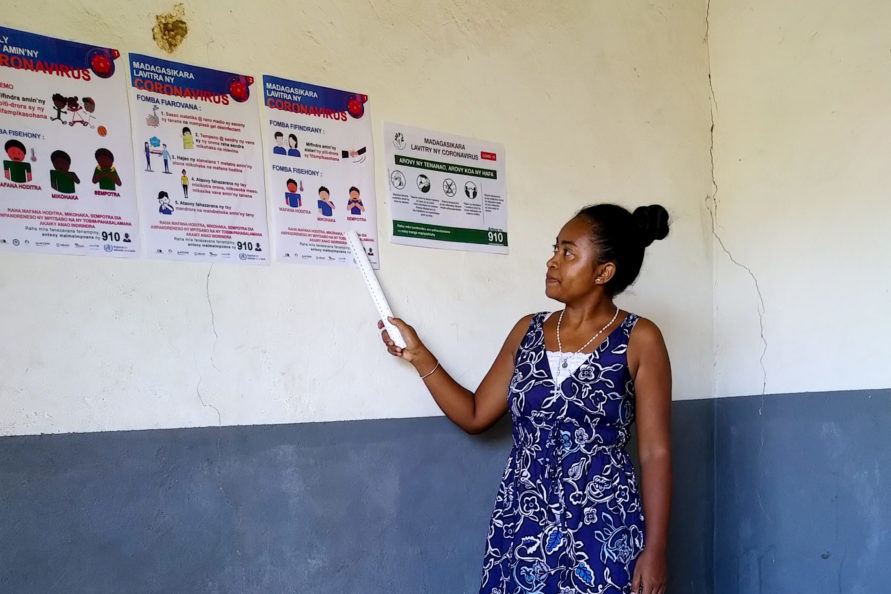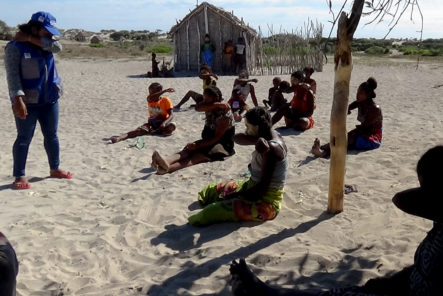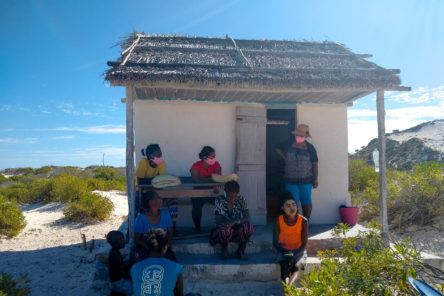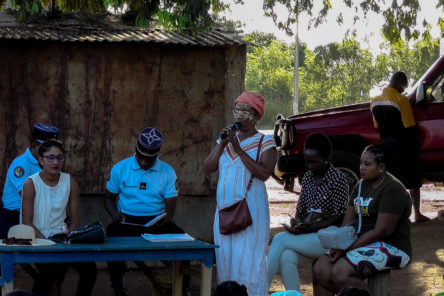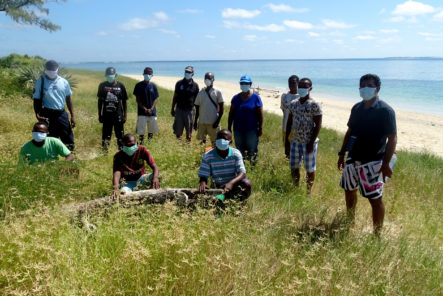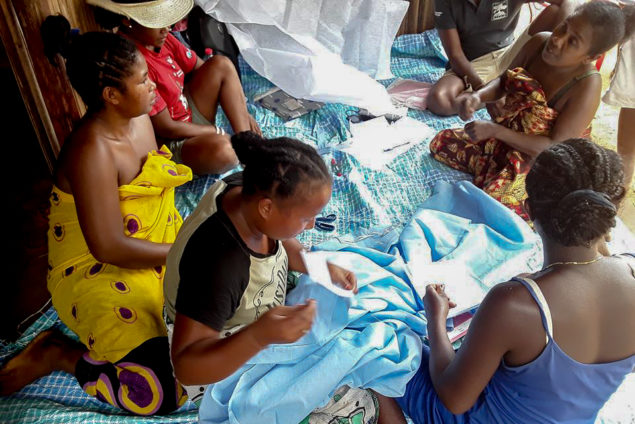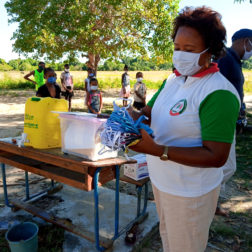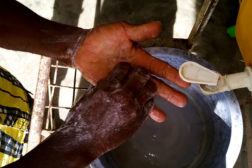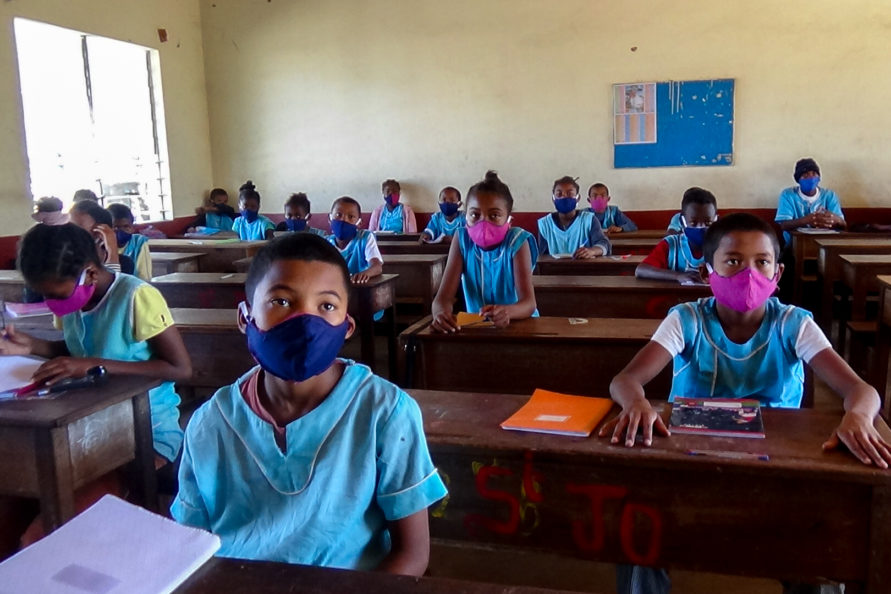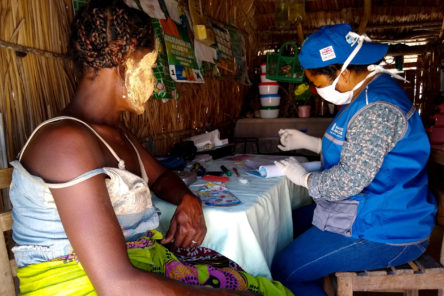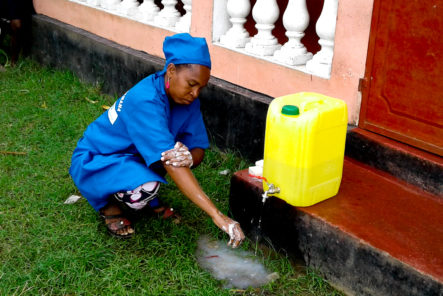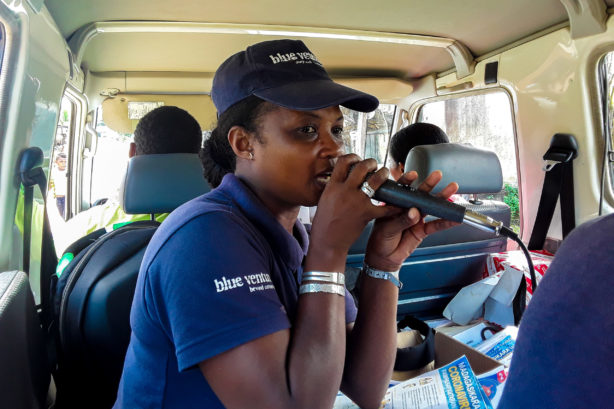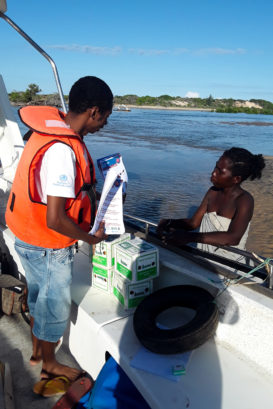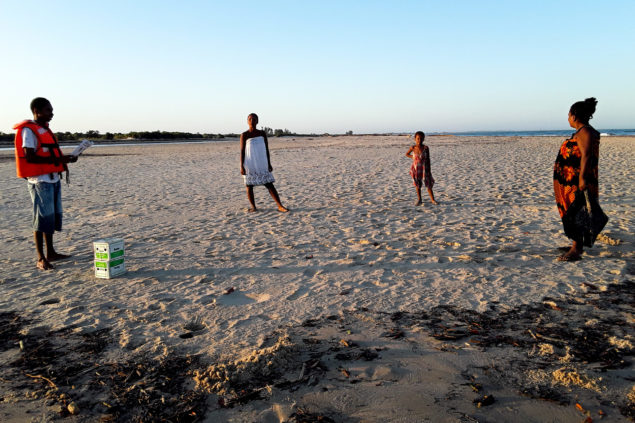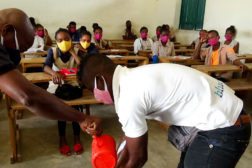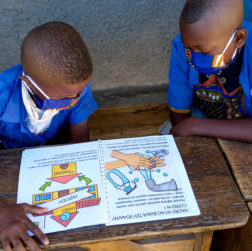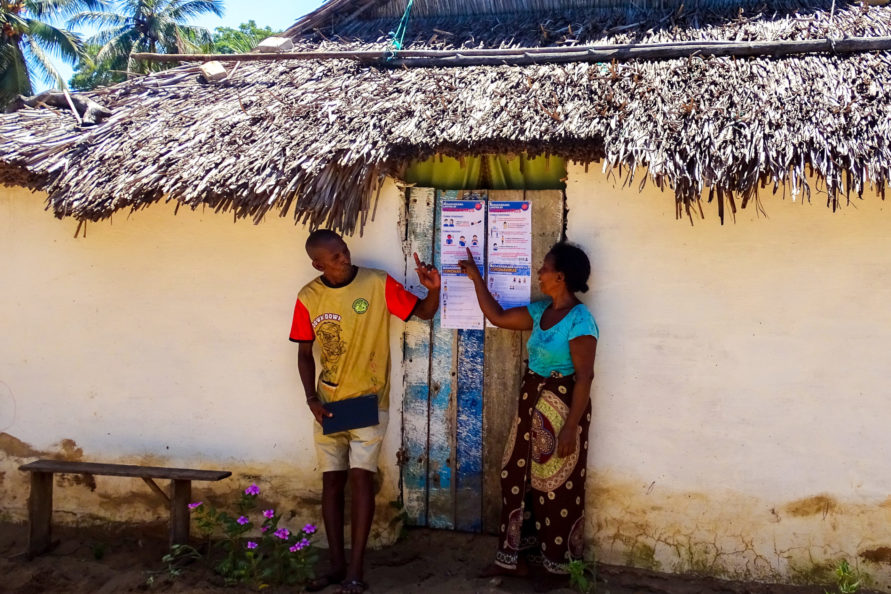Next week our community health programme, Safidy, will be celebrating its thirteenth birthday. Back in 2007, as we worked alongside communities to rebuild fisheries, women shared horror stories of a lack of safe birthing facilities, no access to family planning services and no sexual health education.
Witnessing how these unmet health needs were impacting upon the wellbeing of the community – and how poor health was limiting their ability to engage in conservation – we felt compelled to respond. From a single weekly family planning clinic serving 2000 people in 2007, Safidy has expanded to provide maternal and child health care, sexual and reproductive health services and safe water initiatives for all of the 47,000 people living within Blue Ventures’ five programme sites in Madagascar.
Today we continue to respond to communities’ most pressing health needs and this year, that has meant launching a community health response to the COVID-19 pandemic. Four months on from the launch, on the eve of Safidy’s birthday, we reflect upon the different ways in which we are trying to reduce community transmission of the virus, protect the most vulnerable and strengthen health systems so they can better cope with the crisis.
Training
Training of community representatives on COVID-19 awareness and in techniques to prevent transmission of the virus has been central to our response, and so far we’ve supported training sessions for around 480 people across 80 villages in Madagascar.
Komity Loharano members are key participants in the training; these are village vigilance committees that mobilise during times of crisis, with each village having their own Komity Loharano composed of a range of community leaders. During the pandemic, they have been responsible for disseminating and collecting information about COVID-19 in their communities.
In an effort to share information as widely as possible, and so that communities can continue to earn an income, fisheries and livelihoods representatives such as fisheries data collectors, aquaculture farmers and mangrove patrollers have also taken part in these training sessions.
Crucially, all community health workers (CHWs) who lead healthcare efforts across Blue Ventures’ field sites in Madagascar have attended COVID-19 training sessions. 83 CHWs have been trained in disease surveillance, symptom management, patient referral, contact tracing, and disinfection and cleaning of health clinics and materials. In doing this, CHWs are helping to build the capacity of the health system, so that it is better able to respond to the pandemic.
Collaborating
If there’s one thing that this pandemic has taught us, it’s that we are living in an increasingly interconnected world and that working together is the most effective way to combat the crisis. We will beat this together, or not at all!
In Madagascar, we’ve collaborated with authorities and health organisations in order to encourage a uniform response to COVID-19, including Mahefa Miaraka, USAID ACCESS, PIVOT, Marie Stopes Madagascar, Wildlife Conservation Society (WCS) and PSI Madagascar. Only through collaborating with our health partners can we ensure that our response effectively dovetails with that of the Ministry of Public Health, and that essential health services are maintained.
To build the capacity of community health monitoring systems, with support from our partners and the Ministry of Public Health, we have supported regional and community trainers across our sites to roll out training in community health monitoring. There are currently twelve trainers in the southwest, seven in Belo-sur-Mer, eight in Ambanja, and four in Mahajamba, who are all responsible for training Komity Loharano members and other community representatives.
These cascading training courses enable the application of preventive measures while strengthening everyone’s skills in the early detection and reporting of risks and events in public health” – The Madagascar PHE Network
Distributing vital supplies
Like many organisations who support isolated communities, ensuring that they have the means to protect themselves from the spread of the virus has been an important focus for us. Across the 80 villages where we’ve facilitated training, we have established water and handwashing stations and distributed soap to support regular handwashing and sanitation. We are also working to secure access to personal protective equipment (PPE) for all health staff working in our areas.
As much as possible, we aim to enable communities to lead their own response efforts and harness existing local structures and skills. In Ambanja, northwest Madagascar, Mothers groups and Youth groups have been making reusable face masks for community birth attendants – local women who support the delivery of babies.
Similarly, in southwest Madagascar, the local women’s association in Andavadoaka have made over 5000 face masks to be distributed to a range of different groups, including aquaculture farmers, school students taking exams, beekeepers, mangrove patrollers, individual households, the mayoral offices and more.
Collecting data
For our teams, limiting the spread of the virus within communities is the absolute priority and one crucial way to do this is to ensure that cases can be tracked. In the villages where many of the communities we support live, this isn’t always simple; communities live in close quarters and have to go out most days to busy markets to buy food and supplies, and whilst social distancing measures are in place, if the virus were to spread, it would be a challenge to identify the source.
With support from the Safidy team, CHWs have developed new skills, learning to collect and manage data in order to track COVID-19 cases. They’re using novel data collection systems, some of them using web based data management tools for the first time. This enables the inputting of information as simply and safely as possible, and means that CHWs can alert communities as soon as cases begin to increase.
Adapting ways of working
Around the world, all of our teams have had to adapt the ways we work, whether that’s meant working from home, having regular phone calls with community partners rather than going out to the field, or setting up online gatherings for partner organisations.
CHWs on the other hand, have no choice but to see patients face to face. In order to protect these front line workers when they come into contact with patients, we’ve worked to train them to provide ‘no touch’ care to patients.
Despite our best efforts, PPE isn’t always readily available, so developing these protocols is enabling health workers to continue to provide care, without putting themselves or their patients at risk. To complement ‘no-touch’ care, women are being taught to self-administer the contraceptive injection, or have been provided with larger supplies of the contraceptive pill in order to reduce clinic visits.
Communicating
Another way in which we’ve adapted the way we work is by producing community outreach media to raise awareness of the virus, without having to physically visit communities to spread the word. Across Madagascar, our creative colleagues have been harnessing the power of music and film to share public health messaging in a way that speaks to the needs and living context of coastal communities.
However, as an organisation that has a long-established, strong presence within communities, safely visiting the areas where we work is one of the most effective ways to ensure that people have understood the message.
Where possible, our teams have visited vulnerable people to teach about shielding, and carried out community outreach tours to distribute supplies and share public health messaging. On market day in Mahajamba – the one day per week when everyone goes to the market to buy goods – the team uses the opportunity to spread the word about the pandemic and reinforce advice about social distancing.
As a result of COVID-19, we are witnessing some of the world’s most vulnerable communities being pushed deeper into poverty, with their limited access to basic services being reduced even further. As this pandemic continues to evolve, we will work with communities to minimise the impact of the pandemic on their health and on their livelihoods. Our expertise in both of these areas puts us in a unique position to respond to these interconnected challenges.
As we approach Safidy’s birthday in the midst of this global crisis, we are reminded of the overwhelming need to put communities first and help them to build the resilience they need to safeguard their health and the environment upon which they depend.
Learn more about Safidy
Support our COVID-19 response
Explore our COVID-19 resource hub


